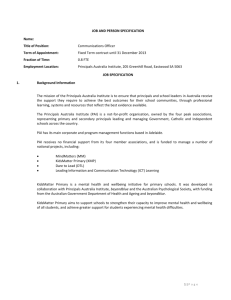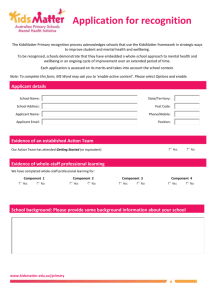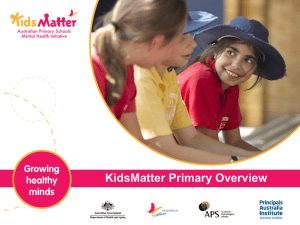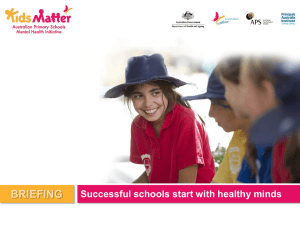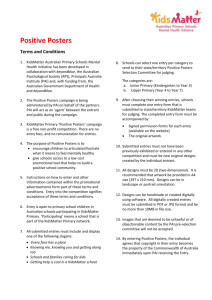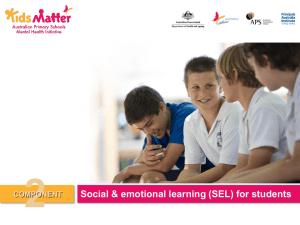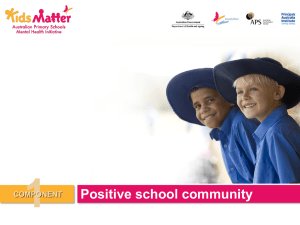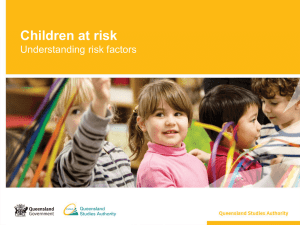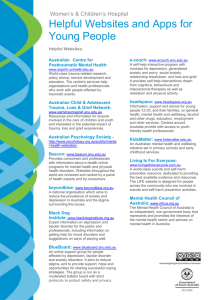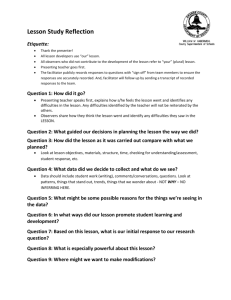Impressive evaluation results lead to significant
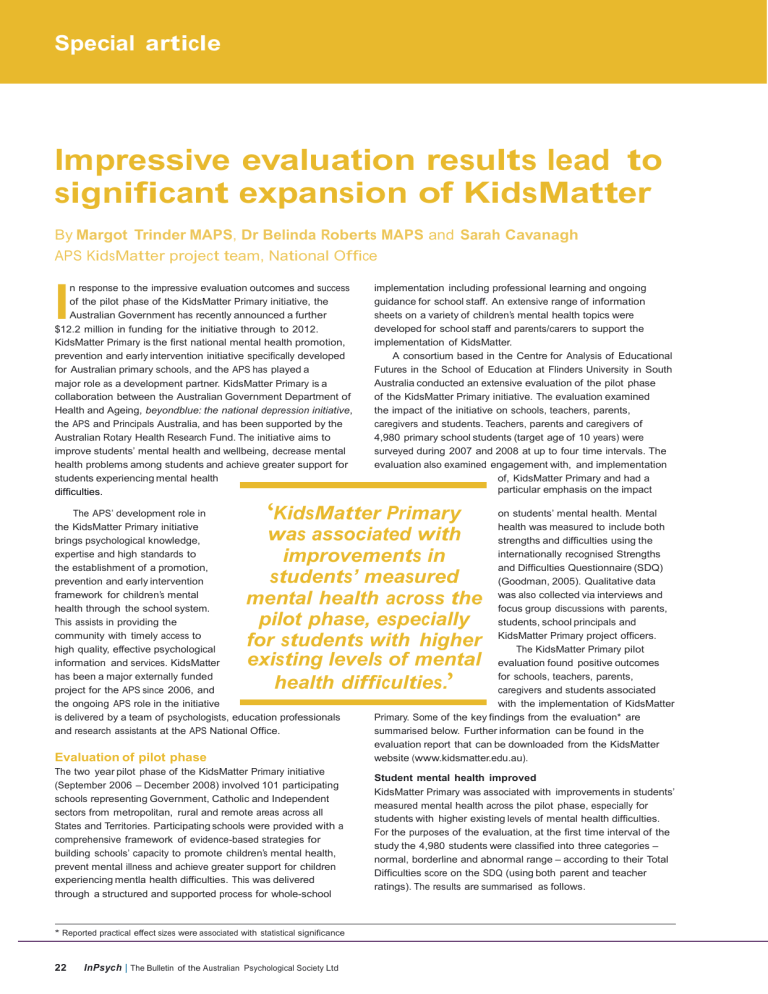
Special article
Impressive evaluation results lead to significant expansion of KidsMatter
By Margot Trinder MAPS , Dr Belinda Roberts MAPS and Sarah Cavanagh
APS KidsMatter project team, National Office
I n response to the impressive evaluation outcomes and success of the pilot phase of the KidsMatter Primary initiative, the
Australian Government has recently announced a further
$12.2 million in funding for the initiative through to 2012.
KidsMatter Primary is the first national mental health promotion, prevention and early intervention initiative specifically developed for Australian primary schools, and the APS has played a major role as a development partner. KidsMatter Primary is a collaboration between the Australian Government Department of
Health and Ageing, beyondblue: the national depression initiative , the APS and Principals Australia, and has been supported by the
Australian Rotary Health Research Fund. The initiative aims to improve students’ mental health and wellbeing, decrease mental health problems among students and achieve greater support for implementation including professional learning and ongoing guidance for school staff. An extensive range of information sheets on a variety of children
’s mental health topics were developed for school staff and parents/carers to support the implementation of KidsMatter.
A consortium based in the Centre for Analysis of Educational
Futures in the School of Education at Flinders University in South
Australia conducted an extensive evaluation of the pilot phase of the KidsMatter Primary initiative. The evaluation examined the impact of the initiative on schools, teachers, parents, caregivers and students. Teachers, parents and caregivers of
4,980 primary school students (target age of 10 years) were surveyed during 2007 and 2008 at up to four time intervals. The evaluation also examined engagement with, and implementation students experiencing mental health difficulties. of, KidsMatter Primary and had a particular emphasis on the impact
The APS’ development role in the KidsMatter Primary initiative brings psychological knowledge, expertise and high standards to the establishment of a promotion, prevention and early intervention framework for children ’s mental health through the school system.
This assists in providing the community with timely access to high quality, effective psychological information and services. KidsMatter has been a major externally funded project for the APS since 2006, and
‘
KidsMatter Primary was associated with improvements in students ’ measured mental health across the pilot phase, especially for students with higher existing levels of mental health difficulties.
the ongoing APS role in the initiative is delivered by a team of psychologists, education professionals
’
on students’ mental health. Mental health was measured to include both strengths and difficulties using the internationally recognised Strengths and Difficulties Questionnaire (SDQ)
(Goodman, 2005). Qualitative data was also collected via interviews and focus group discussions with parents, students, school principals and
KidsMatter Primary project officers.
The KidsMatter Primary pilot evaluation found positive outcomes for schools, teachers, parents, caregivers and students associated with the implementation of KidsMatter
Primary. Some of the key findings from the evaluation* are and research assistants at the APS National Office.
Evaluation of pilot phase
The two year pilot phase of the KidsMatter Primary initiative
(September 2006 – December 2008) involved 101 participating schools representing Government, Catholic and Independent sectors from metropolitan, rural and remote areas across all
States and Territories. Participating schools were provided with a comprehensive framework of evidence-based strategies for building schools’ capacity to promote children’s mental health, prevent mental illness and achieve greater support for children experiencing mentla health difficulties. This was delivered through a structured and supported process for whole-school summarised below. Further information can be found in the evaluation report that can be downloaded from the KidsMatter website (www.kidsmatter.edu.au).
Student mental health improved
KidsMatter Primary was associated with improvements in students’ measured mental health across the pilot phase, especially for students with higher existing levels of mental health difficulties.
For the purposes of the evaluation, at the first time interval of the study the 4,980 students were classified into three categories – normal, borderline and abnormal range
– according to their Total
Difficulties score on the SDQ (using both parent and teacher ratings). The results are summarised as follows.
* Reported practical effect sizes were associated with statistical significance
22 InPsych | The Bulletin of the Australian Psychological Society Ltd
• There was a reduction in the SDQ Total Difficulties score for students in the borderline and abnormal ranges across the period of the trial, with these reductions representing medium to large effect sizes (see Fig. 1).
• The proportion of students classified within the abnormal and borderline ranges was reduced by 4.5 per cent according to teacher ratings, and by 5.8 per cent according to parent and caregiver ratings. This reduction in the classification of students within the abnormal and borderline ranges was associated with a 5 per cent increase in the proportion of students classified as being in the normal range. This represents a positive change for approximately one in five of the students who were originally classified in the abnormal and borderline ranges.
• Students in the abnormal and borderline ranges showed significant improvements over the period of the trial on the Mental Health Strengths scale (a scale designed by the
Flinders University consortium for the evaluation). There were medium effect sizes for mental health strengths for students classified in the abnormal range, and small effect sizes for students in the borderline range (see Fig. 2).
Assistance for families, parents and carers
The KidsMatter framework has a particular component that focuses on parenting education and support for parents and carers of children at the school, while also assisting parents and carers to feel connected to the school. The evaluation showed that parents and caregivers valued the information provided for them to support their children
’s mental health and other results are summarised as follows.
• Seven per cent more parents and caregivers strongly agreed that they had become more involved with the school.
• Eleven per cent more parents and caregivers strongly agreed that their capacity to help their children with social and emotional issues had increased.
• Ten per cent more parents and caregivers strongly agreed that the school
’s capacity to cater for their child’s needs had improved.
School staff knowledge, competence and confidence
Significant increases were found in teachers ’ ratings of their knowledge, competence and confidence with respect to enhancing students ’ social and emotional competence.
Comparisons between questionnaires collected at the beginning and end of the two-year pilot phase demonstrated the following findings.
• Fourteen per cent more teachers strongly agreed that they knew how to help their students to develop social and emotional competence.
• Eight per cent more teachers strongly agreed that the school staff as a whole acted to assist students to develop social and emotional competence.
• Sixteen per cent more teachers strongly agreed that their teaching programs helped students to develop social and emotional competence.
0
10
5
15
25
20
Time 2 Time 1 Time 3 Time 4
LEGEND
Normal range (P)
Normal range (T)
7
6
5
4
3
1
2
Time 1
Figure 1. SDQ Total Difficulties score, as rated by parents (P) and teachers (T), for students classified at Time 1 in the normal, borderline and abnormal range
Borderline range (P)
Borderline range (T)
Time 2 Time 3
Abnormal range (P)
Abnormal range (T)
Time 4
Figure 2. Mental Health Strengths scale score, as rated by parents
(P) and teachers (T), for students classified at Time 1 in the normal, borderline and abnormal range
DECEMBER 2009 23
Special article
• Eleven per cent more teachers strongly agreed that they felt effective in dealing with issues surrounding the mental health of students, such as being capable of identifying students experiencing social and emotional difficulties.
Expansion of KidsMatter Primary
Since the completion of the pilot phase there has been a considerable increase in interest in KidsMatter Primary from schools as well as both education and health sectors. KidsMatter
Primary partners have been collaborating with these sectors to develop effective strategies for disseminating the initiative more widely to schools across Australia. A broader systemic approach to implementation has begun involving formal links between the health and education sectors and the engagement and training of existing personnel in education, health and community systems to support schools using the KidsMatter Primary framework and resources.
Formal participation in KidsMatter Primary requires schools or systems to identify relevant personnel who can be trained to provide implementation support to schools and deliver KidsMatter professional learning to all staff in these schools. Collaborating with education and health at the national, State and local level will also enable clusters of KidsMatter schools that are proximally located to establish more systematic links with health and community services and existing policies, processes and initiatives.
New schools across most States and Territories have already committed to formally implementing KidsMatter Primary from
2009 and new KidsMatter Primary schools are expected in all jurisdictions by early 2010.
KidsMatter Primary information resources available online
During the pilot phase of KidsMatter Primary, an extensive range of information resources were developed to support schools implementing the initiative. Many of these resources can now be accessed by all schools and the general public via the KidsMatter website. The resources include a suite of 21 expert reviewed Resource Packs that provide evidence-based information on a range of topics relevant to children ’s mental health and development (e.g., forming and maintaining friendships; effective discipline; knowing when to get help for children; serious behaviour problems; anxiety problems).
Each Resource Pack contains:
• A parent information sheet that introduces the topic in an easy to read format
• A detailed overview of each topic area that reviews the key issues in accessible language
• Practical suggestions for parents and carers to use with their children at home
• Practical suggestions for school staff to use at school
• A list of other resources that include links to downloadable material, useful books and resources that have been selected for their quality and practical relevance
Another key resource that is now available through the
KidsMatter website is the KidsMatter Programs Guide. The Guide was developed to assist schools to make informed decisions when selecting mental health and wellbeing programs for their individual school community. By presenting key information on more than 70 programs (e.g., documented research about effectiveness and the theoretical underpinning of programs), the
Guide enables schools to compare and select quality evidence- based programs that focus on developing a positive school community, enhancing the social and emotional competence of students, providing parenting support and education, or targeting the specific issues of students experiencing mental health difficulties.
These mental health resources are also an extremely valuable resource for psychologists working with children with mental health concerns and their parents/carers, and for those working in school settings. The full suite of KidsMatter information resources for parents, carers and school staff and the KidsMatter
Programs Guide can be downloaded from www.kidsmatter.edu. au/resources. n
To find out more about the KidsMatter Initiatives, visit www.kidsmatter.edu.au. The Manager of Child and Youth
Project at APS National Office can be contacted on s.cavanagh@psychology.org.au.
Reference
Goodman, R. (2005). Strengths and Difficulties Questionnaire. Retrieved
August 7th 2007 from www.sdqinfo.com/questionnaires/austral/ aus10.pdf
KidsMatter expands to the early childhood sector
Following the success of KidsMatter Primary, the Australian
Government has committed $6.5 million to pilot the
KidsMatter framework in over 100 long day care, preschool and kindergartens during 2010 –2011. The APS is partnering with Early Childhood Australia, beyondblue and the Australian
Government Department of Health and Ageing to adapt the initiative for early childhood services.
KidsMatter Early Childhood will focus on children aged from birth to five years, and, in line with KidsMatter Primary, aims to enable long day care, preschool and kindergarten services to implement evidence-based mental health promotion, prevention and early intervention strategies to:
• Improve the social and emotional health and wellbeing of children from birth to school age
• Reduce mental health problems amongst children
• Achieve greater support for children experiencing mental health difficulties and their families.
Representatives from each of the early childhood services selected for the pilot trial attended a National Briefing in Melbourne in November 2009 to officially commence participation in the initiative.
24 InPsych | The Bulletin of the Australian Psychological Society Ltd
